WMG News
Celebrating British Science Week 2023
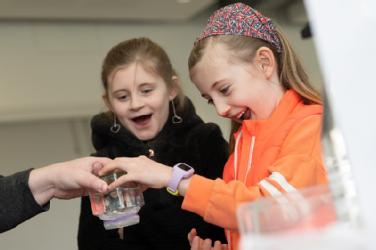 The WMG Outreach team had another busy, fun-packed British Science Week, taking part in a total of seven special STEM events reaching out to more than 2,200 young scientists, teachers, and families.
The WMG Outreach team had another busy, fun-packed British Science Week, taking part in a total of seven special STEM events reaching out to more than 2,200 young scientists, teachers, and families.
Two further events had also been planned for around 400 more students, but these had to be postponed due to the snow.
British Science Week is a ten-day celebration of science, technology, engineering and maths; and is a chance to look into the future and celebrate the impact scientific ideas can make on society. In support, the Outreach Team took part in the University of Warwick’s ‘Slice of Science;’ hosted science days at local schools, while WMG’s Jianhua Yang, Tudor Dodoiu, Iyabo Adamu and Marcelle Batson-Warner took part in Robot Day Coventry.
At Slice of Science, the University welcomed over 350 people. The Outreach Team ran an area called ‘Experience Engineering’ which featured science experiments, the opportunity to write code to control a digital embroidery machine, the navigation of robotic vehicles through a maze, an interactive puzzle showing the electronics inside a car, aerodynamics experiments and more.
WMG’s Director of Outreach and Widening Participation, Professor Margaret Low, explained: “These experiences allow students to see how their school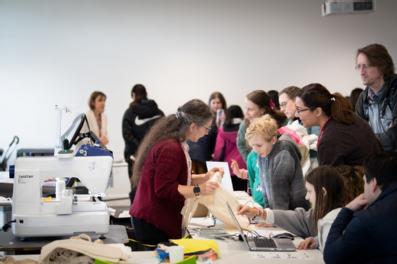 learning applies to complicated and world-changing technologies. Through our outreach programmes we hope to inspire young people to pursue careers in STEM, widen participation in Higher Education and make the STEM workforce more diverse.”
learning applies to complicated and world-changing technologies. Through our outreach programmes we hope to inspire young people to pursue careers in STEM, widen participation in Higher Education and make the STEM workforce more diverse.”
WMG’s Widening Participation Co-ordinator, Dr Phil Jemmett, added: “WMG and the High Value Manufacturing Catapult have outreach activities that are designed to give students a sense of ownership, since there are always elements they can re-create or try out at home. All the experiments we use in science shows or at public events are written up on our website under WMG Experiments, and we show the audience how it all works.
“It’s never magic – this is something anyone can do if they put their mind to it. We want to show people how exciting science and engineering can be, and that anyone can be an engineer.”
Find out more about WMG’s Outreach programme here: Public engagement and Outreach (warwick.ac.uk)
Mark Urbanowski, Principal Engineer, responds to the Government’s proposed cuts to active travel funding budgets
 Expert comment from Mark Urbanowski.
Expert comment from Mark Urbanowski.
Mark Urbanowski, Principal Engineer at WMG at the University of Warwick, said: “Travelling around the UK’s towns and cities is getting increasingly congested, polluted and unsafe. A key part of the solution to this problem, along with helping reach the UK’s Net Zero goal, is getting people and goods moved in efficient and clean vehicles, correctly sized for the journey, passenger and job requirements.
“Active travel, walking and cycling, as well as emerging micromobility transport options like e-bikes, e-cargo vehicles and e-scooters, need the right infrastructure to make them convenient and safe to use. Without investment for infrastructure and integration into the broader public transport system, modal shift to these vehicle types; by commuters, families and businesses; will languish behind the rest of Europe. It’s an issue we will be addressing at our Micromobility event in May.”
EV-elocity project recognised at prestigious engineering awards
The EV-elocity project, involving engineers and researchers from WMG at the University of Warwick, has won a Collaborate to Innovate Award, from The Engineer magazine, in the Energy & Environment category.
The Awards celebrate the very best engineering collaborations and innovations across the UK.
EV-elocity is a research and development project looking at increasing the uptake of electric vehicles by helping consumers to monetise their investment using vehicle-to-grid (V2G) innovation.
With vehicle-to-grid (V2G) technology, electric vehicle (EV) batteries could store electricity - when there is an abundant supply - to power homes and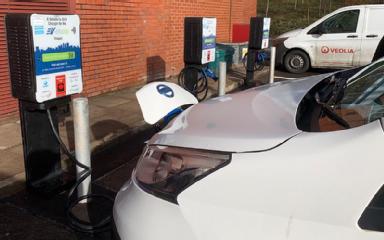 businesses and to discharge it back to the national grid when it is most needed.
businesses and to discharge it back to the national grid when it is most needed.
Researchers at WMG developed a new model that quantified the degradation in the vehicle’s battery because of different EV charging strategies. The model highlighted that it was possible to manage the battery to mitigate much of the degradation and it was possible to even extend battery life through proper control and battery conditioning.
This enables better use of renewable energy, lower carbon footprint, less pressure on the grid and financial savings, which can help electric vehicle owners pay back their investment.
The EV-elocity project has deployed V2G chargers in a range of locations across England as part of large-scale trials to gain technical, customer and commercial insights on the emerging technology. It is also investigating if, and how, additional use from V2G charging may affect EV battery life.
Professor of Systems Modelling, James Marco, explains: “One of the unique aspects of EV-elocity, was the integration of EV technology with future energy infrastructure, such as vehicle-to-grid, to demonstrate at scale how novel methods of EV charging can provide multiple benefits for both the consumer and the environment.”
The project, led by Cenex, a not-for-profit consultancy specialising in delivery of low carbon vehicles and energy infrastructure projects also involves the Universities of Nottingham and Warwick; Leeds and Nottingham City Councils; and CrowdCharge, a platform that integrates and optimises smart electric vehicle charges.
EV-elocity is funded by the Department for Business Energy and Industrial Strategy (BEIS) and the Office for Zero Emission Vehicles (OZEV), in partnership with Innovate UK, part of UK Research and Innovation.
Read more about the award-wining EV-elocity project here: EV-elocity Project | vehicle-to-grid (V2G) innovation with electric vehicles
Sustainable, low carbon circular plastic economy enabled by advanced plastic recycling process
New research shows an 80% reduction in global warming potential (GWP), when compared to incineration, by processing waste plastic via a unique advanced recycling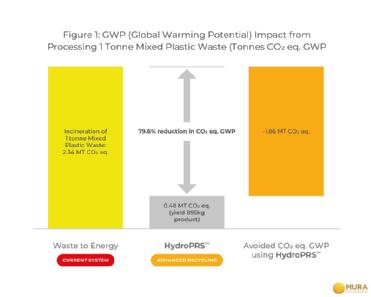 solution known as HydroPRS™, in a paper published by experts at WMG, University of Warwick.
solution known as HydroPRS™, in a paper published by experts at WMG, University of Warwick.
Researchers from WMG’s Sustainable Materials and Manufacturing team have been working with Mura Technology on a project focusing on the advanced recycling industry and the environmental impact of the associated processes.
Advanced recycling technologies (also known as chemical recycling) include a range of processes that break plastics down, converting them into hydrocarbon products that can replace the virgin fossil feedstocks used by the chemicals industry to create new plastics and other industrial products such as asphalt.
Dr Stuart Coles, Reader of Sustainable Materials and Manufacturing at WMG, University of Warwick, explained: “Advanced recycling will play an important role in realising the circular economy of plastics. The work conducted at WMG demonstrates a clear pathway towards Net Zero in recycled plastics and highlights improvements on the environmental footprint when compared with both existing production and disposal routes.
“We are delighted to see this work published as we explore the full potential of this technology moving forward.”
The peer-reviewed Life Cycle Assessment (LCA), reports that significantly reduced carbon emissions (measured as GWP in kilograms of CO2 equivalents) can be achieved if waste plastic is diverted towards HydroPRS™ and away from waste incineration – a comparable end of life treatment and currently, the fate of many ‘unrecyclable’ plastics.
Pioneered by Mura Technology, HydroPRS™, unlike pyrolysis, utilises supercritical water to convert post-consumer flexible, multi-layered and rigid plastics into high yields of stable, premium petrochemical feedstocks. Importantly, the products produced in the HydroPRS™ process were found in the LCA to have at least a comparable GWP when compared with naphtha, the fossil oil-based feedstock used in the production of plastics.
Dr Steve Mahon, Mura Technology’s CEO, said: “Resolving the global plastics crisis while reducing carbon emissions globally will inextricably require that the world is able to substitute fossil-based naphtha and other hydrocarbons for more sustainable feedstocks. This is Mura Technology’s ultimate goal and our innately scalable, innovative advanced recycling process using supercritical water is uniquely placed to pave the way to enable a low-carbon global circular plastics economy.”
Currently, the fate of unrecycled waste plastics is landfill, incineration or leakage into our waterways and oceans. All have negative impacts on the environment. Whilst incineration recovers some energy from plastic, none of these processes keep material within the circular economy, which in turn sustains the demand for virgin plastic from fossil-based sources.
Mura’s Chief Sustainability Officer, Dr Geoff Brighty, added: “As the global economy transitions away from fossil fuels, circular economies must operate at as low an environmental cost as possible. Alongside using the LCA to identify process improvements, the WMG team have demonstrated a clear, deliverable pathway to Net Zero for the HydroPRS™ process. This will help Mura decarbonise the petrochemical sector, whilst also reducing demand for fossil oil for plastic production by regenerating plastic waste into their feedstocks.”
The LCA is focussed on Mura’s first site in Teesside, UK and was funded through Innovate UK’s Smart Sustainable Plastic Packaging challenge (SSPP), as part of one of the demonstrator projects (grant number 49801).
Read the Hydrothermal Treatment of Waste Plastics: An Environmental Impact Study paper in full here s10924-023-02792-3.pdf (springer.com)
Expert comment from Professor David Greenwood
WMG is delighted at the news that Britishvolt have been purchased by Recharge.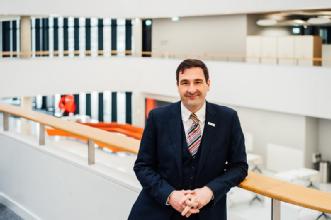
Professor David Greenwood, Director of Industrial Engagement at WMG, University of Warwick said: “This is great news for the UK, allowing us to capitalise on the value realised under the previous ownership. High value jobs will be protected and created in the UK as a result of this purchase - not just in the company, but in its upstream and downstream supply chains.
“For the UK to remain globally competitive, it is critical that we establish a strong battery manufacturing base to support many of our key industrial sectors, including automotive, aerospace, rail, marine and energy storage.”
WMG looks forward to continuing to support the growth of the UK battery industry.
Read more about the news here: https://www.bbc.co.uk/news/business-64754879
The students electrifying the motorsport industry across the world
- As the first team to enter an all-electric racing car into Formula Student (in 2018), students from the University of Warwick are in to Africa to share expertise and drive electric vehicle (EV) technology across the continent
- They will help launch of Formula Student Africa – a new motorsport competition for students, using only electric vehicles (EVs)
- The diverse team is passionate about increasing representation in motorsport, especially in leadership positions
Students from the University of Warwick are working with fellow students in Africa in a capacity-building project to drive forward electrification in the motor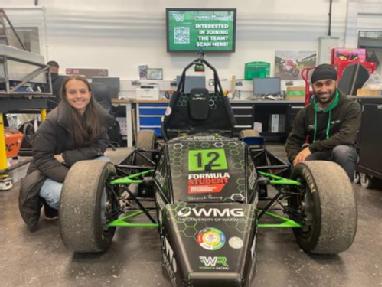 industry.
industry.
Members of the Formula Student team are in South Africa this week to share their knowledge on building and racing electric vehicles. Their expertise will be critical to the launch of Formula Student Africa, an all-electric motorsport competition for students across the continent, based on the UK model.
Six South African universities are already onboard for the series, including the University of Cape Town, University of Johannesburg, University of South Africa, Nelson Mandela Metropolitan University, Cape Peninsula University of Technology and University of the Witwatersrand.
It is hoped that Formula Student Africa will help drive the electrification of transport around Africa, propelled by technological advances in motorsport. In particular, Nelson Mandela Metropolitan University and the University of Warwick’s WMG are keen to collaborate with their state-of-the-art research into EV batteries. The student teams design the batteries themselves as well as the shape and components of their racing car.
Warwick Racing’s team principal Prem Gill, second year Mechanical Engineering student, said: “I’m thrilled to lead such a group of highly motivated and dedicated engineering students who share a passion for motorsport and advanced technology.
“The visit to South Africa is a huge milestone and aligns with my own aspirations to drive positive change in the industry and make a meaningful impact in the world. It’s an opportunity to expand our knowledge, network with industry professionals, and showcase our innovative ideas.
“This venture serves as a crucial moment in the development of Formula Student Africa, as we aim to establish partnerships and network with key players in the industry. Our aspirations for this competition are to foster the next generation of engineers and help to drive sustainability in motorsport.”
Alongside their ground-breaking work on electric racing cars, Warwick’s Formula Student team is championing representation in the motorsport industry. Of the 120 team members, more than 40 are women. 40% of the senior positions in the team are also filled by women.
Warwick Racing’s Chief Suspension Engineer Marieta Kysela, a second year Systems Engineering student, added: “Our team is very diverse, consisting of people from all year groups and degrees, allowing for innovative ideas, solutions and meaningful learning. While there is beginning to be wider representation in the industry, I would like to inspire more women to be leaders in the motorsport sector.”
Professor Robin Clark, Dean of WMG, said: “Warwick’s involvement in Formula Student is well established. It is therefore exciting to see that energy now being directed in a different direction as Formula Student Africa looks to establish itself in the calendar. I am sure that Warwick Racing will share the experience and enthusiasm that is so much part of the team with peers in South Africa and that successful new opportunities will be realised.”
Formula Student is an IMechE competition that Warwick students have participated in for many years. The competition aims to develop young engineers and encourage more young people to take up a career in engineering. The format provides an ideal opportunity for students to demonstrate their engineering knowledge, and test and improve their capabilities to deliver a complex product in the demanding environment of a motorsport competition.
The ultimate aim is to design and race a sports car. This year’s comp takes place at Silverstone. The Warwick student project team uses the name Warwick Racing.
Further details can be found here https://warwickracing.org/
Find out more about the WMG Sustainable Automotive Electrification Master's programme here.
Ends
University of Warwick press office contact:
Annie Slinn
Communications Officer | Press & Media Relations | University of WarwickLink opens in a new window
Email: annie.slinn@warwick.ac.uk
Celebrating women in science
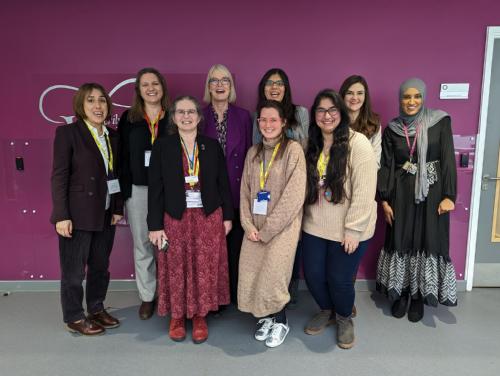 Six female scientists, from WMG at the University of Warwick, joined the students at Eden Girls School Coventry to celebrate International Women and Girls in Science Day.
Six female scientists, from WMG at the University of Warwick, joined the students at Eden Girls School Coventry to celebrate International Women and Girls in Science Day.
The event, organised by the WMG Outreach Team and chaired by WMG’s Executive Chair Margot James, took place on Friday (10th February).
The expert panel, including Dr Claire Dancer; Antonia Betzou; Dr Elspeth Keating; Farah Villa Lopez; Magdalena Cieslak and Rupika Gulati, hosted a lively discussion with the girls about the highs and lows as a ‘woman in science.’
Each of the scientists shared their own personal journey and explained what had inspired them to pursue a career in science.
Margot James, WMG’s Executive Chair, said: “It's no secret that women have historically struggled because of the gender gap in STEM. We’re extremely passionate about this, and through our Outreach programme we are committed to build links with local schools and the community to provide role models that can help create a more equitable future.
“It was an absolute pleasure to meet such an inspiring group of girls, and I know our female scientists have helped to motivate them in their future career choices.”
A year 10 student from Eden Girls School added: “ I really enjoyed the science engineering workshop because it allowed me to understand what options are available to me after secondary school.
“Having women speak about their accomplishments and experiences really inspired me into thinking more about science, and trying my hardest to be able to achieve great things like they have. I learned so much and enjoyed everything.”
Find out more about WMG’s Outreach here: Public engagement and Outreach (warwick.ac.uk)
WMG students take part in training for UK's largest cyber competition
 Students at WMG at the University of Warwick, recently took part in training for Defence Cyber Marvel 2, Western Europe’s largest live-fire cyber exercise. The training was designed to give the students a taste of cyber competitions ahead of the main event due to take place in February.
Students at WMG at the University of Warwick, recently took part in training for Defence Cyber Marvel 2, Western Europe’s largest live-fire cyber exercise. The training was designed to give the students a taste of cyber competitions ahead of the main event due to take place in February.
WMG entered two teams with 21 students in total, and along with three other teams they formed part of an unofficial Blue Team. The Blue Team were faced with the challenge of defending a large network of machines with different operating systems from a Red Team.
The WMG teams had great success in the training competition, placing second and third overall.
Dr Harjinder Lallie, Discipline Group Leader for Cyber Security at WMG, University of Warwick said: “Both teams did really well and should be proud of their performance in the competition. Their approach and attitude was exceptional and acts as a testament to the exceptional students on the degree course.”
The Defence Cyber Marvel 2 training competition was a fantastic opportunity for WMG students, with the University of Warwick being the only university invited to enter.
The students have established themselves as leaders in Capture the Flag (CFT) competitions and their success at the training competition has led to some of our students being selected to take part in the main event for Defence Cyber Marvel. This is an international Blue Team competition (A Network Defence Competition) involving the best cyber defence teams within the UK and NATO. The competition will test the skills of the participants to stop potential cyber-attacks against the UK.
Here are some comments from some of the students who took part:
"We all had a lot of fun, and it was an excellent opportunity to develop blue-team experience".
“It was a great opportunity to test some of the skills and knowledge that we had learnt over the past three years, in a challenging and well-funded environment. We gained invaluable experience and hope to take part in more similar competitions in the future.”
Find out more about the WMG BSc Cyber Security here: BSc Cyber Security (warwick.ac.uk)
Read more about WMG’s latest cyber security news here: Latest News (warwick.ac.uk)
Warwick University will help Bolivia become the “energy cell of the world”
Historic agreement sees the university and Bolivia collaborate on lithium battery project and provide scholarships for Bolivian students
The University of Warwick is set to help Bolivia become a world leader in renewable energies and electric vehicles, thanks to a historic partnership on lithium battery research with the Bolivian Government.
The partnership, funded by the UK’s Foreign Commonwealth & Development Office (FCDO), will help develop lithium’s application as a power source in everything from electric cars to mobile phones.
Bolivia’s vast salt flats harbour an estimated 39 million tonnes of lithium reserve, positioning the country to be one of the world’s most important suppliers in the coming decades. The projects supports Bolivia’s ambition to provide 40% of the world’s supply of lithium by 2030. It will see Bolivia be at the forefront of lithium value chain, lead to higher paying employment and industry and a transition away from simple extraction and exploitation of raw materials.
Several master’s degree scholarships will also be offered to Bolivian students and the University’s WMG will link up with Yacimentos de Lito Bolivianos,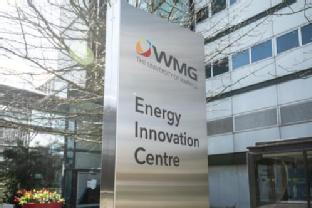 Bolivia’s lithium mining institution in a multi-year research project to improve the understanding and possibilities for lithium battery technology.
Bolivia’s lithium mining institution in a multi-year research project to improve the understanding and possibilities for lithium battery technology.
David Rutley, Minister for the Americas and Caribbean at FCDO was present at the signing of the agreement and said: “This is a landmark partnership between Bolivia and Warwick – one of our great UK universities. This collaboration will help unlock the possibilities of battery technology in a new era of clean energy. The partnership will also address the drawbacks associated with using fresh water in the extraction process – making the industry more sustainable and less environmentally damaging.”
“This agreement demonstrates the potential for scientific and technological cooperation of our two great nations. It could help see Bolivia become the energy cell of the world.”
Professor Mike Shipman, University of Warwick’s Pro-Vice- Chancellor (International), said: “We are excited to be partnering with the Ministry of Hydrocarbons and Energies and Yacimentos de Litio Bolivanos. This collaboration will draw on the University’s extensive expertise in battery technologies and build new capabilities in Bolivia and help the global transition to sustainable power solutions through innovative research and training”.
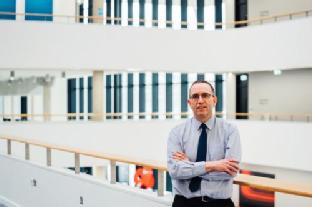 Professor Robin Clark, Dean of WMG at the University of Warwick said: “This opportunity is one that will help ensure WMG stays at the forefront of global battery research and education. It has been a pleasure to share our work with our Bolivian partners and we hope that this is the start of a long and productive relationship.”
Professor Robin Clark, Dean of WMG at the University of Warwick said: “This opportunity is one that will help ensure WMG stays at the forefront of global battery research and education. It has been a pleasure to share our work with our Bolivian partners and we hope that this is the start of a long and productive relationship.”
Notes to editors:
For more information contact Tania Corbett, Media Relations Manager at Warwick University: tania.corbett@warwick.ac.ukLink opens in a new windowLink opens in a new window | Mob: +44 (0) 7824 540 727. General and out of hours press office number 02476 151 512
Interviews available in Spanish and English.
The research project between Warwick/WMG and Bolivia’s Yacimentos de Lito Bolivianos YLB will focus of synthesis and characterization of battery cathode materials derived from lithium extracted from the Salar de Uyuni. The partnerships will combine expertise on battery manufacturing and characterization between the two groups. Access to the sources of lithium supplies is critical for the development of active materials within Li-ion battery and requires the UK to develop strategic partnerships internationally.
WMG in landmark battery development partnership
Researchers at WMG at the University of Warwick, are part of a unique four-way partnership, with Addionics, technology innovation catalyst CPI and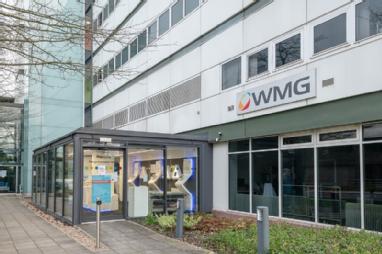 James Durrans Group, which will position the UK as a technology hub for global battery development.
James Durrans Group, which will position the UK as a technology hub for global battery development.
Project Constellation is an extension of Project STELLAR which focused on improving battery power and cycle life. Project Constellation takes the research to the next level addressing improvements to battery performance, which will in turn lower development and production costs.
The team at WMG will use its expertise in pilot scale electrode production, cell manufacturing and electrochemical testing to support and de-risk rapid technology screening and accelerate the route to market.
Farid Tariq Ph.D, CTO and Co-founder of Addionics, explains:" Constellation builds on the success of Stellar taking it beyond basic tests and towards industrially relevant scales. We are excited because it provides a strong integration piece of our technology with world leaders in coating and fabrication, and active material fabrication (WMG, CPI, James Durrans) that can show how our very smartly designed and structured current collectors can fit into a viable battery ecosystem and provide benefits from our technology. This is readily transferable knowledge and will push the creation of new methods to overcome modern limitations of batteries and fabrication."
Mark Copley, Chief Engineer in WMG at the University of Warwick’s Electrochemical Materials and Manufacturing team said: “WMG is delighted to be a partner in the CONSTELLATION consortium. Utilising our experience in scaling up new technologies, from lab to pilot line, we feel that we will be able to further the development of Addionics’ current collector technology whilst coupling in Durrans’ graphite and formulation developments, as derived by CPI.
“The project goals fit very well with the ideals of WMG, which is to work collaboratively with industry to deliver high-quality, applied, research and development. We look forward to the results that will be generated through this funded collaborative effort.
Project Constellation is a two year project, funded by the UK Government’s Faraday Institution’s Faraday Battery Challenge Round 5 Innovation.
About the partners
Addionics
Addionics is a next-generation battery technology company revolutionizing battery performance through its chemistry-agnostic Smart 3D Electrode architecture. The company’s scalable, cost-effective manufacturing process combined with its AI-based optimization software significantly improves the performance of any kind of chemistry, achieving batteries with higher energy density, faster charging, and longer lifetime, at low cost. With the mission to accelerate an electrified economy and decarbonized future, Addionics is unlocking the full potential and accelerating the electrification revolution through its drop-in solutions.
CPI
We take great ideas and inventions, and we make them a reality. Born in the North East of England in 2004, CPI is an independent deep tech innovation organisation and a founding member of the High Value Manufacturing Catapult.
We're a team of intelligent people using advances in science and technology to solve the biggest global challenges in healthcare and sustainability. Through our incredible people and innovation infrastructure, we collaborate with our partners in industry, academia, government, and the investment community to accelerate the development and commercialisation of innovative products.
Our work ranges from health technologies, advanced drug delivery systems, and medicines manufacturing innovations for multiple modalities including small molecules, biologics, and nucleic acids; to developing sustainable materials for energy storage and packaging, as well as novel food, feed, and nutraceuticals, that are all underpinned by digital technology. We turn the entrepreneurial spirit and radical thinking of our people and partners into incredible impact that makes our world a better place.
Let’s innovate together: uk-cpi.comLink opens in a new window
Connect with us: LinkedIn TwitterLink opens in a new window InstagramLink opens in a new window FacebookLink opens in a new window
James Durrans Group
Long established family owned manufacturing company (1863) based in Penistone near Sheffield but with manufacturing sites across the globe. We provide pro-active solutions to our customer needs. Experts in carbon processing and technology and the manufacture of heat resistant coatings and graphitic dispersions.
